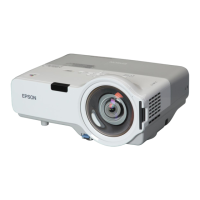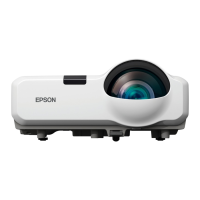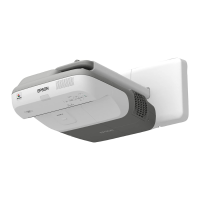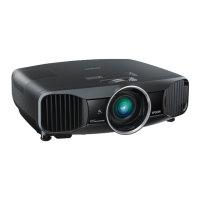88 Solving Problems
You see vertical stripes or the image still looks blurry after
trying the solutions in the previous section.
■ If you’re projecting from a computer and displaying an image that
contains a lot of fine detail, you may notice one or more vertical
stripes or bands, or some of the characters may look heavy or
blurred. Press the
Enter/Auto button on the remote control to
automatically reset the projector’s tracking and sync settings.
■ If necessary, you can manually adjust the Tracking and Sync
settings on the Signal menu as described on page 59.
To help you adjust these settings, fill the screen with a detailed
image, such as a desktop background pattern or black text on a
white background. Adjust the
Tracking setting to eliminate
vertical stripes; adjust the
Sync setting to increase the sharpness.
The colors of the image are not right.
■ Try selecting a different Color Mode. See page 57 for
instructions.
■ If you’re displaying video, adjust the Color Saturation and Tint
settings on the Image menu. See page 57 for instructions.
■ Adjust the Brightness, Contrast, and Color Adjustment
settings on the Image menu. See page 57.
■ Make sure the input signal setting on the Signal menu matches
the signal from the connected device. See page 58 for details.
If the image is too purple and you’ve connected a computer or
other RGB device to the
Computer1 or Computer2 port, select
RGB as the input source. If you’ve connected a component video
device to one of these ports, select
Component.
If you’re projecting from a composite video or S-Video source,
select the correct
Video Signal in the Signal menu.
■ Check your computer display settings to correct the color balance.
■ If the image seems dark, the lamp may be nearing time for
replacement. Check the lamp hours as described on page 64 and
replace the lamp, if necessary, as described on page 76.
note
Because of the different
technologies used, your
projected image may not
exactly match the colors on
your laptop or computer
monitor.

